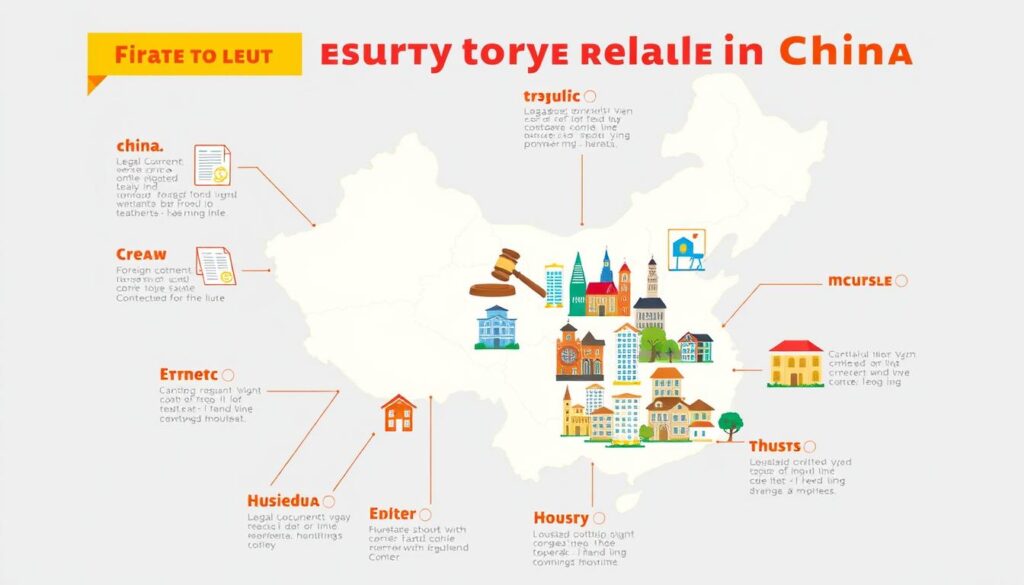Are you considering purchasing property in China as a foreigner? Navigating the complexities of buying real estate in China requires a thorough understanding of the legal framework, restrictions, and financial implications. As a starting point, foreign investors should be aware that despite the booming real estate market in China, all land is state-owned, with property ownership granted on a leasehold basis typically lasting up to 70 years1.
To successfully buy real estate in China, prospective buyers must meet specific conditions, such as residing in China for at least a year with a valid work or student permit1. Moreover, foreigners are only allowed to purchase one property for residential purposes and are generally prohibited from leasing it out2. Financially, U.S. citizens should prepare adequately, as property prices in major cities like Beijing, Shanghai, and Shenzhen are significantly higher than in many parts of the United States1
Understanding the nuances of the purchasing process is crucial. Foreign investors must ensure they have sufficient financial resources and be prepared for a substantial down payment, which can be around 30% of the purchasing price3. Additionally, navigating the bureaucratic and legal stipulations can be challenging but necessary for a successful acquisition.
Discover more insights on buyingproperty in China and secure overseas transactions
Key Takeaways: How to Buy a Property in China
- Foreigners must have resided in China for one year with a valid permit to buy property.
- Only one residential property is allowed per foreign buyer, with leasing restrictions.
- Property prices in major Chinese cities are significantly higher compared to the U.S.
- The minimum down payment required is around 30% of the property’s price.
- Leasehold ownership in China typically lasts up to 70 years.
Contact us if you are Interested in Buying Property Abroad!
Introduction to Buying Real Estate in China
China’s rapidly evolving real estate market offers diverse opportunities for foreign investors. Despite the pandemic’s impact, property prices in China have shown resilience, achieving a 12.5% year-on-year growth. This trend highlights the potential gains for those eyeing long-term investments or residential plans in China.
The Current Real Estate Market
The allure of China’s property market is undeniable for many foreign investors. Understanding the regulations for foreigners buying property in China is crucial for navigating this dynamic environment. China’s urban land-use rights for residential purposes are granted for a maximum of seventy years, which is distinct compared to other global markets like the U.S4.
Interest for Foreign Investors
Foreign buyers looking to purchase property in China often do so for several reasons. These can include long-term residential plans, business-related stays, or as strategic investment opportunities. Regardless of the reason, being well-acquainted with the legal process for expats purchasing property in is essential. Real estate in China can be transferred through sale or gift, ensuring that the new owner assumes both the land-use rights and home ownership simultaneously4.
Moreover, the regulation and legal frameworks governing real estate transactions are stringent, encompassing the Property Rights Law, which consists of nineteen chapters and 247 articles, enacted on March 16, 20074. This emphasizes the importance for potential investors to familiarize themselves with local laws and processes thoroughly. Understanding these specificities ensures compliance and secures your investment under Chinese law.
In conclusion, investing in China’s property market can be highly rewarding but comes with its own set of challenges. Compliance with the local regulations is mandatory, and being aware of these legalities will facilitate smoother transactions and protect your interests as a foreign investor.
Legal Framework for Foreigners

The legal landscape for foreign nationals property ownership in China is complex and multifaceted. The rules for overseas individuals buying real estate in China are influenced by various laws and regulations, primarily focusing on property usage and ownership rights.
Property Law in China
China’s property laws, which are heavily influenced by the political leadership, such as the Xi Administration, reflect the civil and socialist law traditions of the country5. The primary legal document governing property in China is the Property Law, which outlines that land ownership is divided into state and collective ownership, with land properties not available for outright purchase but for transfer with compensation of state-owned land use rights by the government6. This system integrates elements from the National People’s Congress, the State Council, and the Supreme People’s Court5.
Restrictions and Allowances
Foreign institutions can only purchase non-residential houses for office work in registered cities in China, unless otherwise stipulated by laws and regulations6. Overseas individuals working or studying in China are permitted to buy one set of housing for self-use, adhering to the current regulations6. The approval forms for foreign affairs, especially in cities like Beijing, require specific documentation, including a copy of the property ownership certificate and notarized passports with a Chinese translation6. Additionally, the legal framework in China includes elements such as the National Supervisory Commission and the Independent Commission Against Corruption, which spearhead anti-corruption measures5.
When buying property, foreigners must go through an approval procedure at the foreign approval office before completing the purchase, ensuring compliance with local regulations6. The necessary supporting documents include passports and alien residence certificates6. The Ministry of Housing and Construction governs decisions on property development and permits foreign nationals to buy homes if they can demonstrate at least a year’s tax proof or social security contributions, especially in metropolitan areas like Shanghai and Beijing6. This framework indicates that while the rules for overseas individuals buying real estate in China are stringent, they are navigable with the appropriate documentation and approvals.
Can Foreigners buy Real Estate in China

For non-Chinese individuals, seeking to buy property in China involves meeting several specific criteria. The regulations are established to ensure proper utilization of real estate resources and to manage foreign investments in the property market.
Overview of Rules
Foreigners can indeed buy properties in China but with significant restrictions. They must have legally resided in the country for at least 12 months before the purchase, supported by valid permits such as working or studying visas7. Furthermore, foreigners can purchase only one residential property for personal use and cannot own additional residential properties7. Those interested in commercial properties need to obtain a Chinese business license, as the process is more complex and restricted to business purposes7.
Nationwide Requirements
Across China, the general requirements for non-Chinese buying property in China include proving residency. Prospective buyers must show they have lived in China for at least one year, using valid proof such as tax receipts and social security contributions8. Furthermore, there are financial obligations such as paying 30% of the property price in RMB and complying with tax requirements, including a 1.2% real estate tax and 5% VAT on the property value8.
Additionally, non-Chinese buyers need the final sale contract to be notarized to ensure the transaction’s legality. They must also engage authorized real estate professionals or legal counsel to navigate China’s complex property market and regulations78.
Regional Variations
Regional differences can add another layer of complexity to the requirements for non-Chinese buying property in China. For instance, in Shanghai, foreigners must prove they are married to purchase property8. Meanwhile, in Beijing, foreigners must demonstrate payment of social security and taxes for at least five years prior to purchasing property8. These area-specific prerequisites underscore the importance of understanding local regulations thoroughly before proceeding with any property acquisition.
By adhering to these stringent requirements and understanding regional variations, non-Chinese buyers will be better positioned to navigate the property market in China effectively.
Types of Properties Available for Foreigners

Buying property in China as a foreign national involves understanding the limitations and opportunities available to you. Foreigners face several restrictions, but there are still appealing options within the residential and commercial property markets.
Residential Properties
Foreigners looking to purchase residential properties in China will find themselves limited to a single residence for personal use. This restriction is primarily due to property laws which prevent non-nationals from owning multiple homes. Additionally, the property must be for personal living purposes, not for renting or commercial use7.
Prices in major cities reflect a significant investment. For example, in Beijing, the average price per square meter for apartments within the city center is approximately $16,410 USD, while those outside the city center average $8,078 USD9. Other cities like Shanghai and Shenzhen show similar trends, with city center prices standing at $17,635 USD and $16,858 USD respectively9. These investment figures underscore the high demand and competitive nature of China’s real estate market.
Commercial Properties
When it comes to commercial properties, foreign nationals have more opportunities for involvement, particularly for business engagement. However, buying commercial property in China requires a Chinese business license, which adds another layer of complexity to the procurement process7. Additionally, foreigners must comply with numerous regulatory requirements including obtaining government approval and adhering to strict usage guidelines.
Despite these hurdles, the commercial real estate market offers promising investment potential for those prepared to navigate the intricate processes involved. Commercial property purchases in major cities come with their high price tags but equally high returns, making them a feasible option for business-minded individuals.
It is important for foreigners interested in buying property in China as a foreign national to be well-informed of all legal stipulations and market conditions. With careful planning and thorough understanding, these property ventures can be rewarding.
Contact us if you are Interested in Buying Property Abroad!
Steps to Purchase Property in China

Navigating the legal process for expats purchasing property in China requires a strategic approach, starting with proof of residency and extending through to the official registration process. These steps are essential whether you are considering a residential or commercial investment.
Getting Started: Proof of Residency
Establishing proof of residency is the first step in the purchase process. Foreigners must have lived in China for at least one year on a valid residence permit to buy property2. This proof of residency is verified by the Municipal Bureau of Public Security7.
Finding the Right Property
Once residency is verified, potential buyers can begin finding the right property. It’s advisable to work with a real estate agent familiar with local market trends. Foreigners can buy residential, commercial, and industrial properties, depending on their status and purpose of purchase8. The legal process for expats purchasing property in China is streamlined through the expertise of local real estate professionals.
Understanding Agreements and Contracts
Agreements and contracts form a critical part of the buying process. After finding a suitable property, price negotiations take place followed by a preliminary purchase agreement requiring a 1% deposit of the purchase value8. For those acquiring a mortgage, 30% of the purchase price must be paid in RMB8. Official contracts are notarized and must receive government approval to proceed.
Official Registration Process
The final step involves the official registration process. The transaction reaches completion upon the transfer of the title deed, a crucial component of the legal process for expats purchasing property in China here27. Governmental bodies ensure that all legal and financial prerequisites are met, culminating in the registry of ownership.
Financial Considerations and Budgeting

When it comes to financial considerations for non-Chinese buying property in China, the high property prices in major cities like Beijing, Shanghai, and Shenzhen are a key factor. Apartments in these areas can range from $3,913 to $16,410 per square meter, necessitating robust financial planning.
Property Prices in Major Cities
China’s urbanization drive, which is set to continue beyond 2030, plays a significant role in property market dynamics, driving up prices and creating new investment opportunities10. The booming real estate market contributes to a substantial portion of China’s GDP, valued at $18.53 billion as estimated by the International Monetary Fund in 202310.
Associated Fees and Taxes
Prospective foreign property buyers must also consider associated fees and taxes. These expenses generally include deed tax, transfer fees, maintenance tax, notarization fees, and estate agent commissions, collectively amounting to approximately 11% of the property’s selling price. This can significantly impact the overall cost, making financial prudence essential for non-Chinese buyers.
Mortgage and Loan Options
Finding a mortgage as a foreign buyer in China can be challenging. Generally, foreign nationals need to provide at least 30% of the property’s value as a down payment11. Furthermore, local mortgage terms may come with higher interest rates compared to domestic loans, adding another layer of financial consideration11. Additionally, with China’s economy projected to grow by 4.5% in 2024, stability in domestic growth may further boost real estate prices, justifying a deeper consideration of financial commitments10.
Understanding these financial considerations for non-Chinese buying property in China can make a significant difference, ensuring a smooth and informed purchasing process. For more insights, you may refer to this article. Maintaining a balanced budget and being aware of potential risks in the housing market, potentially mitigated by government intervention, can safeguard investments10.
Restrictions and Limitations for Foreign Buyers
Purchasing real estate in China brings a set of stringent rules for overseas individuals buying real estate in China. These restrictions are designed to regulate foreign ownership and ensure compliance with local laws.
Use of Property
One of the primary rules for overseas individuals buying real estate in is the limitation on property use. Foreigners can purchase only one property for self-use, a regulation put forth by the “Guidelines on Further Regulating the Administration over Purchase of Real Estate by Foreign Individuals and Entities” introduced in 201012. This rule aims to curb speculative investments and ensure that the purchase is genuinely for residential purposes.
Geographical Restrictions
Geographic limitations also play a crucial role in the rules for overseas individuals buying real estate in China. Specific regions might be entirely off-limits for foreign ownership. Additionally, foreign institutions without a registered office in China are barred from purchasing property, emphasizing the need for a legitimate business presence to engage in real estate investments13.
Regulatory Requirements
Foreign buyers must comply with several regulatory requirements when purchasing property in China. The “Circular on Issues Concerning the Foreign Exchange Administration of Real Estate Market” issued in 2006 outlines the payment protocols for foreign individuals and entities, ensuring that transactions comply with foreign exchange regulations12. Furthermore, establishing proof of tax or social security payments may be required, highlighting the multifaceted regulatory landscape that governs these purchases.
The aim behind these regulations is to stabilize property prices and reduce speculative capital inflow, as evidenced by the impact on small real estate agencies in Shanghai, where approximately 400 agencies had to close due to the tightening regulations13. This underscores the significant influence these rules have on the real estate market dynamics.
Benefits of Owning Property in China

Owning property in China can offer significant advantages, particularly for those interested in the growth potential of this vibrant real estate market. For foreign investors, the landscape presents numerous opportunities that can enhance both investment portfolios and personal living experiences.
Investment Opportunities
The real estate market in China is continually evolving, creating numerous investment opportunities. Strategic locations, especially in major cities, are often poised for significant development, making them attractive to foreign investors. Chinese buyers accounted for 3.5% of the total housing transaction value in California by 2013, representing a 30-fold increase from 200814. This growth suggests a strong international interest in property, highlighting the potential for foreign real estate investment in China.
Regulators in China are considering easing mortgage rules to spur home purchases in major cities14. This potential policy adjustment could further boost the real estate market, creating favorable conditions for foreign investors looking to diversify their portfolios. Additionally, fluctuations in new home prices and industry adjustments are contributing to an investment atmosphere ripe with opportunity14.
Personal Use
Beyond investment gains, owning property in China can also cater to personal needs. For individuals frequently traveling for business or considering a more stable living arrangement, purchasing a property can offer significant advantages. Having a permanent base in a bustling city can be a practical solution, providing comfort and security during extended stays.
Moreover, given the continuous urban development and enhancements in infrastructure, properties in China are becoming increasingly appealing for personal consumption. This appeal is reflected in the rising interest from both local and foreign buyers, making it an ideal time for potential investors to consider their options in the Chinese real estate market14.
The evolving legal and financial landscape further adds to the attractiveness of Chinese properties. As efforts are made to streamline processes, foreign investors and buyers can anticipate a more systematic and investor-friendly environment15.
Challenges of Owning Property in China
Owning property in China as a foreign national comes with a myriad of legal and bureaucratic hurdles. The primary challenge lies in navigating the complex property laws, which include stringent regulations regarding property ownership and land use. Given that foreigners cannot directly own land in China, they must instead secure land use rights, often through a Wholly Foreign-Owned Enterprise (WFOE) or a Joint Venture (JV)16. Additionally, understanding and complying with local laws and obtaining the necessary approvals can be time-consuming and confusing, particularly due to language barriers and cultural differences.
Legal and Bureaucratic Hurdles
The legal framework governing property ownership in China is intricate and often opaque for foreign buyers. Engaging with reliable real estate agents and law firms is essential to ensure adherence to all legal requirements and to mitigate potential risks. Furthermore, the bureaucratic procedures involved in property transactions can be arduous, requiring extensive documentation and numerous approvals. This complexity is compounded by the constant changes in regulations, which can catch foreign buyers off guard if they are not well-prepared16. Therefore, it’s crucial to stay updated and seek professional advice when necessary.
Financial Considerations
Financial considerations are another significant challenge when buying property in China as a foreign national. Property prices in key cities such as Beijing and Shanghai are remarkably high, which results in substantial upfront costs16. Additionally, associated fees and taxes further elevate the financial burden. For instance, foreign buyers face higher down payment requirements and interest rates on mortgages, which can impact overall affordability. Moreover, the risk of redevelopment and potential eviction with inadequate compensation adds an additional layer of uncertainty and financial stress for foreign property owners16. To navigate these financial complexities, rigorous budgeting and a thorough understanding of the financial landscape are imperative.
For more detailed insights into the legal nuances and strategic approaches for establishing a business presence in China, you can view this information about property laws in China.
Contact us if you are Interested in Buying Property Abroad!
FAQ
Can Foreigners Buy Real Estate in China?
Yes, foreigners can buy real estate in China, but they are subject to specific regulations and requirements. They must have resided in China for at least 12 months with a valid work or student permit and are limited to purchasing a single property for residential use.
What are the current market trends in China’s real estate sector?
Despite recent challenges due to the pandemic, China’s real estate market has shown gradual price increases, with a yearly growth rate reaching around 12.5%. Metropolitan areas like Beijing, Shanghai, and Shenzhen have substantially higher property prices compared to many U.S. cities.
What are the main interests for foreign investors in China’s real estate market?
Foreign investors often pursue property in China for long-term residential plans, business ventures, and as an investment avenue. The market’s growth potential and strategic development areas make Chinese real estate an attractive option.
What is the legal framework governing property ownership for foreigners in China?
China’s property law allows foreigners to buy residential properties but restricts them to one property for personal living. Foreigners cannot own the land itself, which is leased from the state, usually for 70 years. Additionally, expats must provide proof of 12-month stay and meet regional conditions like tax or social security contributions.
What restrictions and allowances apply to foreign nationals buying property in China?
Foreigners may only purchase one residential property and are not allowed to lease it. Additional regulations may include providing tax records and social security contributions, particularly in cities like Beijing and Shanghai. Regional restrictions can vary and further limit foreign property ownership.
What are the nationwide requirements for foreigners purchasing property in China?
Foreign buyers need to have lived in China for at least 12 months with a valid work or student permit. They must also show proof of tax payments or social security contributions as per regional demands, along with adhering to the country’s central property laws.
Are there regional variations in the requirements for foreign property ownership in China?
Yes, regional requirements can differ significantly. Cities like Beijing and Shanghai may require additional proof, such as local tax records or social security payments, which can add further complexity to the property ownership process for foreigners.
What types of properties can foreigners buy in China?
Foreigners can purchase residential properties for their own use. While they can engage in commercial property acquisition, the process is considerably more complex and is regulated under different laws compared to residential properties.
What are the initial steps to purchase property in China for foreigners?
Prospective buyers must first establish proof of residency which is verified by the Municipal Bureau of Public Security. They can then work with a real estate agent to find suitable properties, negotiate, and proceed through the official registration process, which includes signing preliminary and official contracts and obtaining government approval.
What financial considerations should be kept in mind when buying property in major Chinese cities?
Property prices in major cities such as Beijing, Shanghai, and Shenzhen can range from ,913 to ,410 per square meter. Additionally, buyers should plan for extra costs such as deed tax, transfer fees, maintenance tax, notarization fees, and estate agent commissions, typically around 11% of the property’s selling price.
What are the restrictions on the use of property by foreigners in China?
Foreigners can only own one residential property intended for their personal use. They are not allowed to lease their property, and commercial real estate transactions are subjected to more robust regulations and processes.
How do geographical restrictions impact foreign buyers in China?
Some areas may restrict or completely prohibit foreign ownership of property. Buyers must carefully check local policies and regional laws, which can impose unique restrictions beyond central government regulations.
What are the main benefits of owning property in China as a foreign national?
Owning property in China offers significant investment opportunities due to the market’s growth potential, especially in strategic development locations. It also provides personal use benefits, such as a stable living arrangement for those frequently traveling to China for business or long-term residence.
What challenges might foreigners face when purchasing property in China?
Foreigners must navigate complex legal and bureaucratic processes, understand local property laws, and manage substantial financial commitments. High property prices, additional taxes, and the potential risk of redevelopment and eviction with inadequate compensation further complicate property ownership for foreigners in China.
Source Links
- https://www.investasian.com/property-investment/buying-property-china/
- https://phcadvisory.com/index/Lists/show/catid/5/id/29.html
- http://www.hangzhouhomes.com/index.php/index/index/newdetail?id=66&lang=en
- https://maint.loc.gov/law/help/real-property-law/china-real-property-law.pdf
- https://en.wikipedia.org/wiki/Property_law_in_China
- https://quickdd.cz/en/information-for-foreigners-purchasing-real-estate-in-china/
- https://www.chinalegalexperts.com/news/can-americans-buy-land-in-china
- https://lawyerschina.net/purchase-a-property-in-china/
- https://wise.com/us/blog/buying-property-in-china
- https://www.investopedia.com/articles/07/invest_china.asp
- https://www.investopedia.com/articles/personal-finance/050815/how-finance-foreign-real-estate.asp
- https://www.china-briefing.com/news/regulations-on-real-estate-property-purchases-by-foreigners-in-china/
- https://www.dezshira.com/updates/2010/11/china-tightens-restrictions-on-real-estate-purchases-by-foreigners.html
- https://www.nar.realtor/china-and-real-estate
- https://www.sinoblawg.com/how-does-a-foreigner-inherit-real-properties-in-china/
- https://www.bostonfed.org/news-and-events/news/2023/11/china-massive-us-real-estate-investment-housing-shock-major-impacts-leslie-shen-boston-fed.aspx

Comments